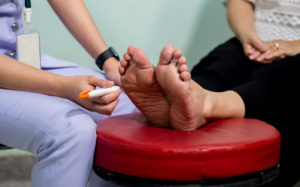How to Test for Neuropathy
 If you begin developing symptoms of neuropathy, you will ultimately want to speak with an expert in the condition for a proper diagnosis and to create a holistic treatment plan. But if you suspect this might be the case, you can also use a series of self-tests at home to determine if neuropathy is a possible cause of your symptoms. Telltale signs of neuropathy include tingling and numbness, particularly in the hands and feet, falling or loss of coordination, pain, or even muscle paralysis. These can also be signs of other conditions and it’s important to seek Broomfield neuropathy treatment. Read on to understand what kind of tests you can administer at home and what further evaluations a doctor will perform.
If you begin developing symptoms of neuropathy, you will ultimately want to speak with an expert in the condition for a proper diagnosis and to create a holistic treatment plan. But if you suspect this might be the case, you can also use a series of self-tests at home to determine if neuropathy is a possible cause of your symptoms. Telltale signs of neuropathy include tingling and numbness, particularly in the hands and feet, falling or loss of coordination, pain, or even muscle paralysis. These can also be signs of other conditions and it’s important to seek Broomfield neuropathy treatment. Read on to understand what kind of tests you can administer at home and what further evaluations a doctor will perform.
Most Common Self-Tests for Neuropathy
Sensation Test
One of the most common signs of neuropathy is a loss of sensation, or diminished sensation, especially in the extremities. If you worry this is occurring, you can carefully touch your first, third, and fifth toes on each foot with an index finger. This can be done by you, but it will also work if a loved one assists you. Pay close attention to the sensation of each toe as it is touched- can you feel it more on one foot than the other? On a particular toe? This can help you gauge your sense of feeling in the feet.
Timed Up and Go (TUG)
To perform this test, you’ll need a chair, preferably a firm one without armrests, a cone or any other item, and a stopwatch or phone app. You’ll place the chair about ten feet from the cone or object and then sit in the chair. Using your stopwatch, record the amount of time it takes you to stand up, walk around the cone, return to the chair, and sit back down. If this consistently takes you longer than 13.5 seconds, it can indicate an increased risk for falls.
Single-Leg Balance
Place yourself next to a wall or sturdy object for this test, in case you need to catch yourself. Once you feel steady, place your arms across your chest in an “x” formation and choose a spot directly in front of you to focus your vision. Lift one leg slowly off the ground and maintain your balance for as long as possible, up to 45 seconds, without uncrossing your arms or shifting your stance. Once done, repeat the same test with your eyes closed. You can take the best of three attempts as your final “score.”
With the eyes closed, an individual between 18 and 49 years old can usually balance for 7 seconds, and this decreases with age. With the eyes open, 40 seconds is standard for those between 18 and 49. If you struggle to maintain balance for even a short period, this can be cause for concern.
If any of these tests prove difficult, or you see a decrease in ability and response over time, be sure to seek Broomfield neuropathy treatment for a diagnosis and to create a treatment plan that prevents further loss of sensation and balance.
Diagnosing Neuropathy
Once you seek care for your suspected neuropathy, your doctor will take you through a full medical history to understand your symptoms, any underlying conditions or injuries, and why you suspect you are suffering from neuropathy. During this conversation, they may ask you about your habits and lifestyle, exposure to toxins, drinking patterns, and family history of neurological disorders. You will also likely undergo a neurological examination, where your tendon reflexes, muscle strength and tone, and coordination are tested, similarly to your self-tests.
They can then determine which tests are needed. Depending on the severity of symptoms, you may undergo blood tests, diagnostic imaging, nerve function tests, or even biopsies to determine the root cause of your issues. Typically, simple blood work can show things like vitamin deficiencies, diabetes, impaired immune function, and other indicators of the conditions that most commonly cause neuropathy, and diagnostic imaging like CT or MRI scans can identify injuries that may contribute. However, when these do not turn up with information, that’s when you may expect more invasive tests to be performed. All of this information can then be used to determine the possible type of neuropathy and how to treat them.
At Fox Integrated Health, we use a holistic approach that helps patients to treat their neuropathy while avoiding unnecessary medication. With a series of techniques approved by the FDA, our Broomfield neuropathy treatment helps patients to return to healthy and pain-free ways of living with neuropathy. They’ll also advise lifestyle changes that could improve neuropathy pain. Contact us today to book your first consult.
